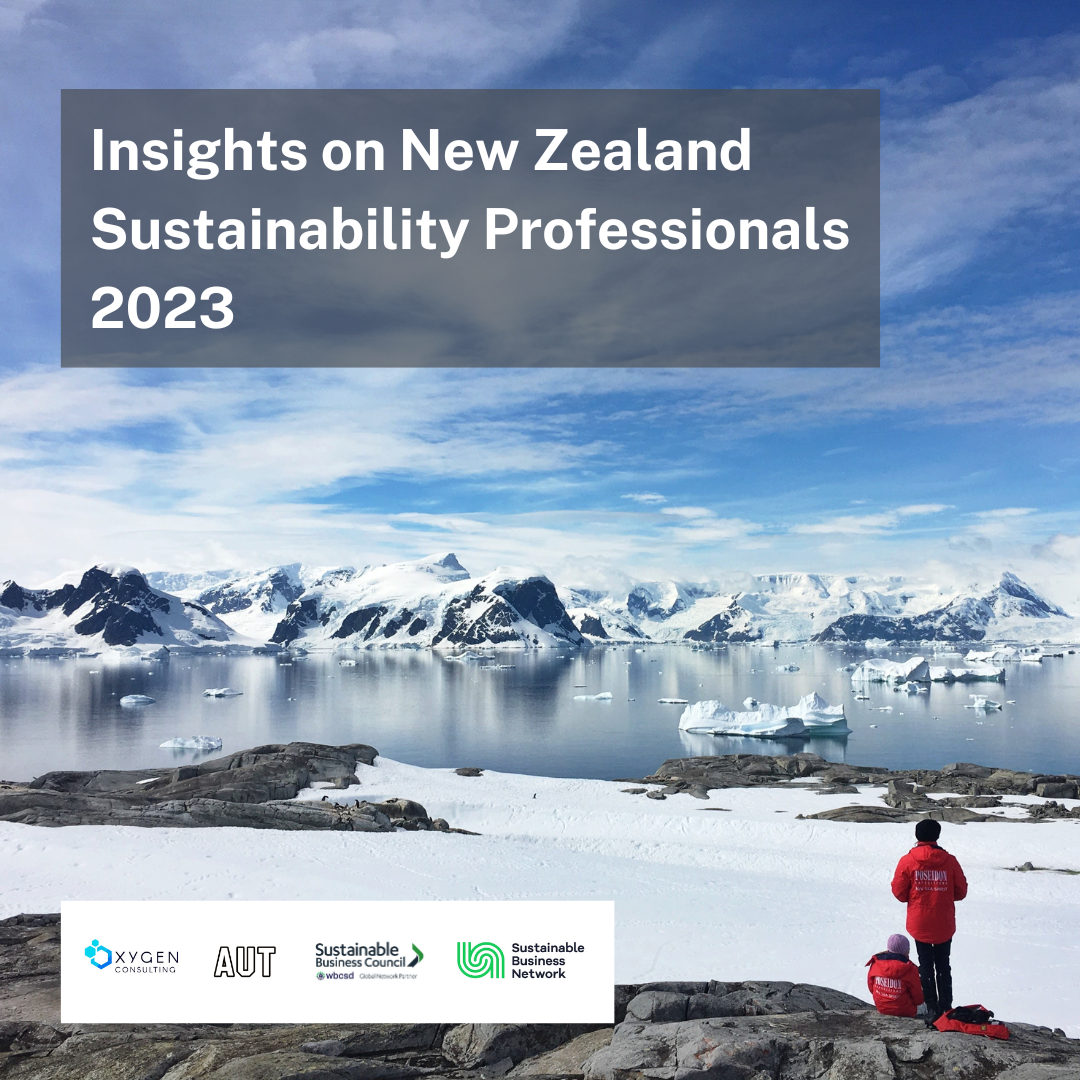New research into New Zealand’s sustainability profession has found most sustainability professionals are reasonably confident in their current ability to do their role. However, only half of them believe their current capability development is enough for their future role requirements.
Oxygen Consulting, in collaboration with the Sustainable Business Council (SBC), Sustainable Business Network (SBN) and Auckland University of Technology (AUT), will today launch the 2023 Insights on New Zealand’s Sustainability Professionals report which aims to dig into the challenges and opportunities for those working in the sustainability profession.
Director of Oxygen Consulting Sarah Holden says the 2023 findings highlight the lack of professional training options in New Zealand as a major barrier faced by sustainability professionals.
“Sustainability is now a commercial imperative for many organisations and there is an increasing expectation that businesses will do it properly, as compliance standards and industry guidelines rapidly evolve, and sustainability becomes fiscally linked to lending or investment requirements. It’s a serious game now, so we need highly capable people at the wheel ensuring their organisations are addressing sustainability appropriately.”
“Our research found that while sustainability professionals feel generally confident in their ability, less than half feel completely competent in their role. This is especially concerning because we also know that sustainability professionals lack professional development and are mostly building their capability through on-the-job experience. We don’t yet have the equivalent of ‘passing the bar’ or a ‘chartered accountant’ professional qualification in the New Zealand sustainability industry, but this should definitely be a consideration in future to further support sustainability professionals and their organisations’ ability to address sustainability consistently and effectively.”
SBC Executive Director Mike Burrell says continued capability gaps will significantly impact Aotearoa New Zealand’s ability to meet its long-term emissions reduction goals, which should be an increasing concern for business.
“As more and more businesses shift to put sustainability at the heart of their strategy, it is critical for organisations to invest in upskilling their staff to give them the confidence and tools required to drive tangible sustainability action and progress from within.”
“The demand for this skillset is only going to grow, so it’s important we develop the capability of the sustainability profession, keep them engaged and offer them progression opportunities. We must also be working to create clear pathways for others like them to join the profession. A strong pipeline of confident sustainability professionals is critical to our ability to achieve a low emissions and climate resilient future for Aotearoa, where all New Zealanders and communities can thrive.”
Auckland University of Technology Professor of Ethics and Sustainability Leadership Marjo Lips-Wiersma says bridging the gap between academic learning and getting one’s first sustainability role is a critical enabler to building capacity.
“Sustainability is a fast-moving field, and as the role of a sustainability professional continues to develop, so too do the skills required to meet growing and increasingly complex challenges.
“It is increasingly important for organisations to work with universities to access the latest international best practice research, promote career options for committed young aspirant sustainability employees and provide them with internships so their skills can be swiftly utilised.”
Diversity remains a challenge
In addition to lack of capability development opportunities among sustainability professionals, this year’s research has also identified a continued a lack of ethnic diversity within the profession. SBN Chief Executive Rachel Brown says the demand for skills and expertise in this area is only going to continue to grow and diversify.
“The scale of the sustainability challenge we are now facing requires a whole new paradigm of thinking. It’s time to truly embrace diversity and make our systems and workforce inclusive. We need to recognise the way we have done things in the past isn’t going to be effective in the future.
“We need new ways of being and doing – from the way we run our economies and organisations, to how we run our cities and towns, how we measure success and more. It’s therefore critical that we open up career pathways, not just for sustainability professionals, to bring in much-needed perspectives from a more diverse set of people.”
Job satisfaction continues
On a positive note, despite sustainability professionals having higher work demands than other New Zealand professionals, they experience greater levels of job satisfaction than other New Zealand professionals.
Oxygen’s Sarah Holden says, “Job satisfaction has been consistently higher than other New Zealand professionals since 2020, when we started this research. In addition to this, sustainability professionals have lower levels of exhaustion and cynicism and are less likely to leave their jobs, suggesting their overall wellbeing is better than the average New Zealand professional.”
“While it is encouraging to see these positive insights regarding wellbeing, the 2023 results identify a number of significant challenges and questions around how we best support the future growth of the profession and improve the capability and development building opportunities available to our sustainability professionals.”
Now in its fourth year, Insights on New Zealand Sustainability Professionals is the only research of its kind in New Zealand. It reveals findings into the role of the sustainability professional, including the capabilities and competencies required, renumeration, job opportunities, and overall wellbeing.
For the first time since its inception, the report also established benchmark data for three different sustainability role types working across the profession:
- General sustainability professionals – focused 100% on managing an organisation’s sustainability agenda
- Specialist sustainability professionals – provide 100% specialist or technical sustainability expertise
- Additional sustainability professionals – do not have sustainability in their job title but have some sustainability responsibilities

